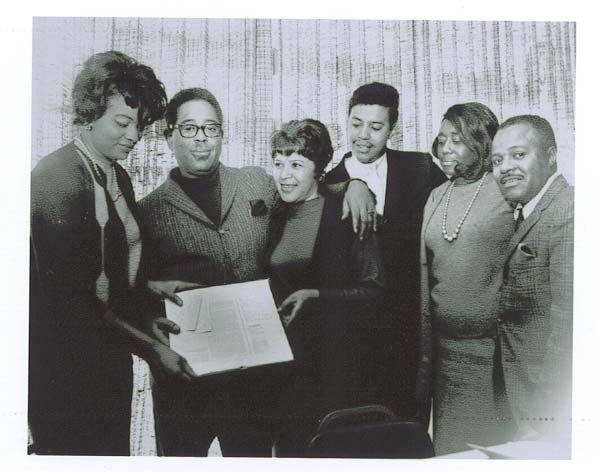
Dizzy Gillespie

From the Left, Juanita Passmore, then Dizzy Gillespie with his arm around Gerri Oliver.
Gerri Oliver Photo Collection
About Dizzy
Born into a large family, Dizzy Gillespie began playing trombone at the age of 12 and a year or so later took up the trumpet. Largely self-taught, he won a musical scholarship but preferred playing music to formal study. In 1935 he quit university and went to live in Philadelphia, where he began playing in local bands. It was during this period that he acquired the nickname by which he was to become universally known. The name Dizzy resulted from his zestful behavior and was actually bestowed by a fellow trumpeter, Fats Palmer, whose life Gillespie saved when Palmer was overcome by fumes in a gas-filled room during a tour with the Frankie Fairfax band .
In 1953, during a party for his wife, the members of a two-man knockabout act fell on his trumpet. The instrument was badly bent but when Gillespie tried to play it he found that, miraculously, he preferred it that way. The upward 45-degree angle of the bell allowed him to hear the notes he was playing sooner than before. In addition he found that when he was playing from a chart, and therefore was looking down, the horn was pointing outwards towards microphone or audience. He liked all these unexpected benefits and within a few weeks had arranged to have a trumpet especially constructed to incorporate them.
In the history of the development of jazz trumpet, Gillespie's place ranked second only to that of Louis Armstrong. In the history of jazz as a whole he was firmly in the small group of major innovators who reshaped the music in a manner so profound that everything that follows has to be measured by reference, conscious or not, to their achievements. Just as Armstrong had created a new trumpet style which affected players of all instruments in the two decades following his emergence in Chicago in 1922, so did Gillespie, in 1940, redirect trumpet players and all other jazz musicians along new and undefined paths. He also reaffirmed the trumpet's vital role in jazz after a decade (the 30s) in which the saxophone had begun its inexorable rise to prominence as the instrument for change. In a wider context Gillespie's steadying hand did much to ensure that bop would survive beyond the impractical, errant genius of Parker. In much of Gillespie's earlier playing the dazzling speed of his execution frequently gave an impression of a purely technical bravura, but as time passed it became clear that there was no lack of ideas or real emotion in his playing. Throughout his career, Gillespie rarely failed to find fresh thoughts; and, beneath the spectacular high note flourishes, the raw excitement and the exuberant vitality, there was a depth of feeling akin to that of the most romantic balladeers. He earned and will forever retain his place as one of the true giants of jazz. Without his presence, the music would have been not only different but much less than it had become.
Born John Birks Gillespie on October 21, 1917 in Cheraw, South Carolina, USA, he died on January 6, 1993, Englewood, New Jersey, USA.